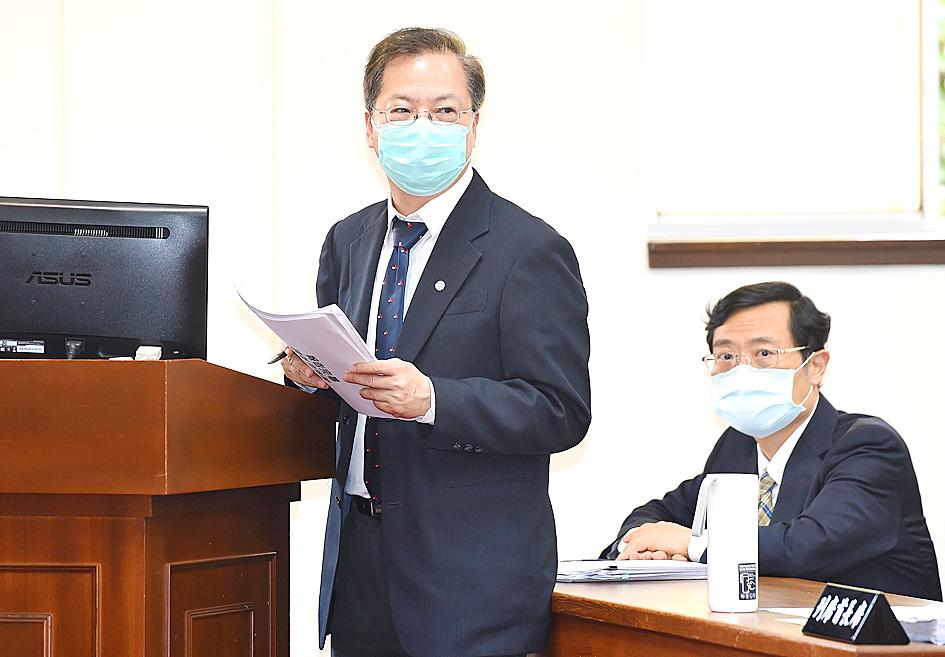The government is to review housing transaction data this week to determine if further action is necessary to cool the property market, National Development Council Minister Kung Ming-hsin (龔明鑫) said yesterday.
Kung made the remark while fielding questions from lawmakers at a meeting of the legislature’s Economics Committee in Taipei on whether unfavorable policy measures have achieved their intended effect.
“The government is to convene a cross-ministerial meeting later this week and review related data to arrive at a conclusion,” Kung said, adding that it takes time for the market to respond.

Photo: Liao Cheng-hui, Taipei Times
Housing transactions, prices and loans all continued an uptick during the January-to-March period, government data showed, fueling concern that more drastic measures might be needed.
Lawmakers have introduced bills to raise taxes to discourage investors from buying multiple homes, as critics have said that house-hoarding has contributed to rising property prices.
A closer look at the market is necessary to analyze the reasons behind the trend, Kung said, adding that media reports have cited data showing that real demand from young buyers is driving property transactions and the resulting price increases.
The economy is lending support after expanding 8.16 percent last quarter, making upward revisions for full-year growth inevitable, Kung said.
The Directorate-General of Budget, Accounting and Statistics is to update its projections on May 28 after forecasting a 4.64 percent increase for the year in February.
Kung declined to speculate if growth could reach 5.5 percent this year, but said that it could rise above the 5 percent mark.
He said that inflation risks are controllable and limited to some raw material prices, adding that education, fuel, rent and other costs remain stable.
Still, the government would monitor price increases on imported industrial and agricultural materials, he said.
Kung dismissed concerns that the economy is overheating, saying that a “red” signal in the government’s business climate monitor in February and March had to do with a low basis of comparison last year.

South Korea’s equity benchmark yesterday crossed a new milestone just a month after surpassing the once-unthinkable 5,000 mark as surging global memory demand powers the country’s biggest chipmakers. The KOSPI advanced as much as 2.6 percent to a record 6,123, with Samsung Electronics Co and SK Hynix Inc each gaining more than 2 percent. With the benchmark now up 45 percent this year, South Korea’s stock market capitalization has also moved past France’s, following last month’s overtaking of Germany’s. Long overlooked by foreign funds, despite being undervalued, South Korean stocks have now emerged as clear winners in the global market. The so-called “artificial intelligence

‘SEISMIC SHIFT’: The researcher forecast there would be about 1.1 billion mobile shipments this year, down from 1.26 billion the prior year and erasing years of gains The global smartphone market is expected to contract 12.9 percent this year due to the unprecedented memorychip shortage, marking “a crisis like no other,” researcher International Data Corp (IDC) said. The new forecast, a dramatic revision down from earlier estimates, gives the latest accounting of the ongoing memory crunch that is affecting every corner of the electronics industry. The demand for advanced memory to power artificial intelligence (AI) tasks has drained global supply until well into next year and jeopardizes the business model of many smartphone makers. IDC forecast about 1.1 billion mobile shipments this year, down from 1.26 billion the prior

Chinese artificial intelligence (AI) start-up DeepSeek’s (深度求索) latest AI model, set to be released as soon as next week, was trained on Nvidia Corp’s most advanced AI chip, the Blackwell, a senior official of US President Donald Trump’s administration said on Monday, in what could represent a violation of US export controls. The US believes DeepSeek will remove the technical indicators that might reveal its use of American AI chips, the official said, adding that the Blackwells are likely clustered at its data center in Inner Mongolia, an autonomous region of China. The person declined to say how the US government received

People stand in a Pokemon store in Tokyo on Thursday. One of the world highest-grossing franchises is celebrated its 30th anniversary yesterday.